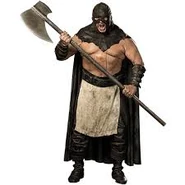Sunday, September 10, 2017
Medical Statistics
In my favorite chapter of one of my all-time favorite books, science and technology historian James Burke illuminates the pivotal epoch when medicine transitioned from voodoo witch-doctor into the scientific evidence-based treatment that brought you CT scans, heart transplants, and gene splicing, to name but a scant few among hundreds of absolute modern miracles.
And to recap, it was not always so.
For millennia, medicine was more "by guess and by God" than anything modern practitioners would recognize as aught but the incantations of rude savages. Bloodletting, ill humors, and closely-guarded secret recipes were in vogue (and killing people like Aztec sacrifices on a festival day when the volcano was angry) right up to and including the Death of George Washington, who at a robust 67 years of age probably had nothing more than a viral cold and sore throat (completely unknown as such at the time), but was repeatedly and successively bled to death, right into shock, coma, and expiration, in December of 1799.
The reason for this sort of voodoo medicine was simple: the doctor who could cure you was afraid to tell anyone else what worked, because once the secret was out, any fool could do it. And there went the business.
Within a few short years, everything had changed, and medicine was forever revolutionized.
And why was that?
Well, it seems a rather diminutive Corsican fellow, arising from amongst the ashes of the French Revolution (Liberty! Equality! Stupidity! etc.),
had arranged for one newfangled curiosity to become common practice. In their rush to give away the store to everyone, the French decided to subsidize not palaces for the monarchs and aristocracy, but instead spend the treasure of the state on hospitals for the peasantry.
And, helpfully, Napoleon created no shortage of patients, with years upon years of wars, famines, and conquests, across the breadth of Europe from Madrid to Moscow.
Consequently, doctors spared the acquaintance of Madame Guillotine were now working on the state's nickel (or franc, if you will). And unlike doctors in prior eras, the state wanted by-god results. And so the Enlightenment, denied entry into medicine for several centuries, was rather forcefully acquainted to doctors by way of statistics and empirical data collection.
The means were simple: there were dozens of hospitals in Paris. One hospital, like other trades, would do only one thing. Like, for example, broken bones. Or women giving birth. Or eye problems. Or gunshot wounds. (There were a lot of those to play with, courtesy of L'Emperor Napoleon.) And so on.
So unlike before, where a given doctor might be expected to deliver a baby, treat a dose of "French disease" (syphilis or gonorrhea), set a broken arm, and treat a skin ailment, all in the same day, now that same doctor might do nothing but see 10 or 20 or 50 broken legs a week. Without meaning to do it, specialization was born.
(They also had a brilliant but quaint custom: everything was free, right up until you decided not to do what the doctor ordered. Whether diet, rest, exercise, medicine, or whatever. It was a free country, but it was also a state hospital. So on the day that the peasant decided he was wiser than the doctor, the orderlies would pick up his pallet, carry it to the curb, the free-thinker would be told "God be with you, monsieur", and he would be deposited alongside the road, free to heal himself as he saw fit. O, for the good old days! But I digress.)
And now that the State was breathing down their necks for results, and payment for services was assured them, nobody wanted to be the worst doctor at the hospital. Madame Guillotine might still be looking for counter-revolutionaries, after all. So they began keeping track of what worked, and what didn't.
At, for example, the hospital for people shot in the leg, they might have 200 patients. Of these, 50 would simply have their bandages re-wrapped every day. Another 50 would be treated by having hot tar poured into the wound to cauterize it and stop bleeding and putrefaction (infection, though that process wasn't discovered for another forty years or so by Mssr. Pasteur, etc.), 50 more would be treated by somebody's grandmother's method of rubbing dog shit and cat pee into the wound daily, and 50 more would have their wounds cleaned with water previously boiled and then cooled, and have new clean bandages exchanged for old, soaked, putrid ones. Then they'd keep score.
Rewrapped cured 20 patients
Hot Tar saved 15 patients
Dog Shit and Cat Pee would save 3 patients
Clean water and bandages would save 48 patients.
So next month, with the previous experimentation known to them, everyone with new gunshot wounds would get clean water and bandages, and they'd save 192 out of 200 patients.
And those results would be discussed, the results written up and published, and disseminated at large to the medical community.
Voila!
Practical and effective medicine, formerly jealously-guarded personal tricks and treatments, now became community property of all doctors, especially those who had formerly been second-rate and second-class citizens, the barber-surgeons. Composed of former headsman like this guy,
who was entitled by rights after a given number of successful head-loppings to be allowed to retire from the chopping block, and hang out a shingle as bona fide and de facto qualified practitioner of certain medical arts (especially throat and neck problems, natch), rather than middling-nobility university-trained physicians in the mold of Hippocrates, the barber-surgeons were more of the try-what-works school of thought. The barber-surgeon charged less than a physician, so the common people were more apt to see them first, or only. And common folks weren't likely to fall for hokum, but would pay for what worked. Physicians thought of them as unlettered tradesmen, rather than noble educated healers, rather like the difference between the astrophysicist who theorized space flight, and the guy who screwed the fuel pumps to the rocket engine and made it go.
So the combination of pragmatism and statistics took the reins of the profession and practice out the hands of those (like the two quacks of Port Royal in Captain Blood)
who were trying to keep their clientele, and put it firmly into the hands of those trying to get it right, who now had scientific evidentiary backing for what to do, and why to do it.
This was a new way to do things, and the increase took the world by storm. Coupled with Pasteur's Germ Theory, and the contributions of many others too numerous to recount in this brief piece, including the brutal statistics of the Plague maps of London in the 1800s
medicine became something advanced by steady, painstaking analytical progression, which ruthlessly weeds out the stupid, the traditional, and the worthless, which had hitherto been the root and branch of the undertaking. (And frequently, the reason for undertakers as well.)
So the French tried to simply give away medical care, and accidentally revolutionized it (which wasn't the Revolution they were trying for, but a damned good one by accident).
So what?
I told you this story to tell you the one I'll post tomorrow.
Part II
Part III
Subscribe to:
Post Comments (Atom)




3 comments:
I stand behind no one in my appreciation of 21st century medicine and dentistry. Recently had emergency surgery for a torn retina. I was NOT going to have MY pallet carried to the road; I did EVERYTHING my surgeon told me to do EXACTLY as I was told to do i and came out OK.
Count me a believer.
Boat Guy
Yup, modern medicine is great. Getting lawyers involved in it not so much.
Doctors are bio technicians and some are better than others just like mechanics or programmers or any number of other occupations. indyjonesouthere
Post a Comment